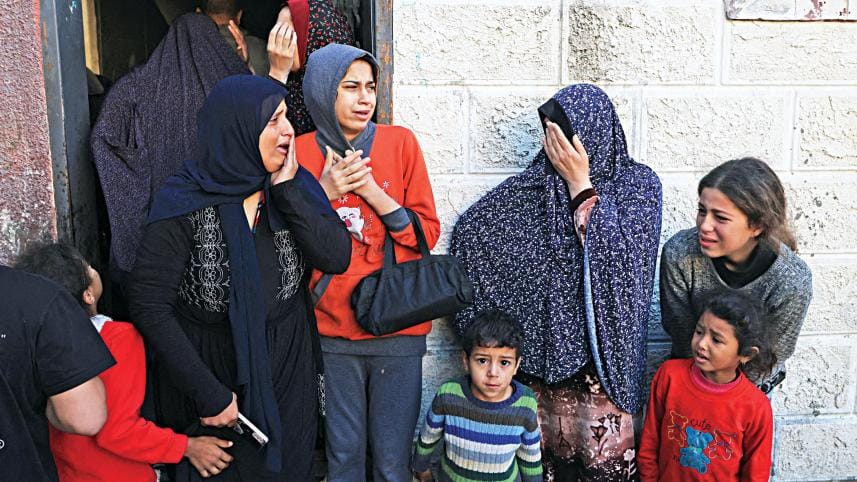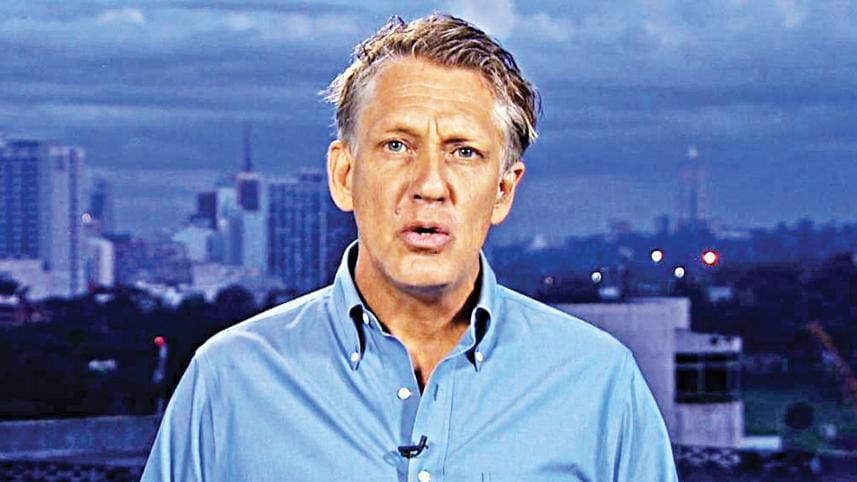Gaza ‘seems like a death zone’

At least 700 Palestinians were killed in Gaza in 24 hours as Israel yesterday stepped up its bombing campaign from air, sea and land across the enclave, which the UN said now resembles a "death zone".
The renewed bombing campaign also comes defying mounting international concerns over the spiralling civilian death toll in Gaza.
The Director General of the Government Media Office in Gaza told Al Jazeera yesterday at yesterday noon that more than 700 Palestinians have been killed in the last 24 hours.

The bombardment followed the collapse on Friday of a seven-day pause in the fighting between Israeli forces and Hamas fighters to allow an exchange of Israeli hostages and Palestinian prisoners.
In a new estimate, UN said around 1.8 million people in Gaza, over 75 percent of the population, had been displaced, many to overcrowded and unsanitary shelters.
Overnight and into yesterday, intense Israeli bombing was reported in Khan Younis, Rafah, and some northern parts, according to Reuters.
Gaza residents yesterday said they feared an Israeli ground offensive on the southern areas was imminent. Tanks had cut off the road between Khan Younis and Deir Al-Balah in central Gaza, effectively dividing the Gaza Strip into three areas, they said.
The Israeli military issued a statement ordering Palestinians to immediately evacuate half a dozen areas in and around Khan Younis. It posted a map highlighting shelters they should go to west of Khan Younis and south towards Rafah, on the border with Egypt.

Everywhere you turn to, there are children with third-degree burns, shrapnel wounds, brain injuries and broken bones.
But residents said that areas they had been told to go to were themselves coming under attack.
Israeli tanks were shelling the eastern sector of Rafah yesterday morning, residents said.
There was hardly any space for more displaced people in the south after hundreds of thousands had fled the Israeli ground invasion in the north of the enclave, the residents said.
"Before, we used to ask ourselves whether we will die or not on this war, but in the past two days since Friday, we fear it is just a matter of time," said Maher, a 37-year-old father of three, who spoke to Reuters by telephone.
"I am a resident of Gaza City, then we moved to Al-Karara in southern Gaza Strip and yesterday we fled to deeper shelter in Khan Younis and today we are trying to flee under the bombardment to Rafah," he said.
UN officials and residents said it was difficult to heed Israeli evacuation orders because of patchy internet access and no regular supply of electricity.
"Everywhere you turn to, there are children with third-degree burns, shrapnel wounds, brain injuries and broken bones," James Elder, Unicef's global spokesperson, told Al Jazeera from Gaza.
"Mothers crying over children who look like they are hours away from death. It seems like a death zone right now," Elder said.
On top of the risk of being killed in an Israeli air strike, disease is the second biggest threat to children, he added.
"We risk seeing as many children… that die from a lack of water, protection and sanitation," Elder said.
Since the conflict started on October 7, 15,523 people, including 6,000 children, have been killed in Gaza, according to Gaza's health ministry.
"I cannot find words strong enough to express our concern over what we're witnessing," the head of the World Health Organization, Tedros Adhanom Ghebreyesus, said yesterday on X, formerly Twitter, demanding a "Ceasefire. NOW."
The Israeli military yesterday said its war planes and helicopters had struck Hamas targets including tunnel shafts, command centres and weapons storage facilities. Naval forces had hit Hamas vessels on the coast, it said.
The Israeli military yesterday said it had carried out around 10,000 air strikes since the war started.
Palestinian health officials said air strikes destroyed several houses in the Al-Karara town near Khan Younis overnight, killing several people including children.
Residents and Hamas media also reported intensive bombing in the east of Zeitoun in Gaza City and in Tel Al-Zaatar in northern Gaza Strip.
The UN humanitarian agency OCHA said at least 160 Palestinian deaths were reported in two incidents in northern Gaza Saturday: the bombing of a six-storey building in Jabalia refugee camp, and of an entire block in a Gaza City neighbourhood.
In a sign of growing US concern about the human cost of the war, US Vice President Kamala Harris said too many innocent Palestinians had been killed in Gaza, and Defense Secretary Lloyd Austin deemed it a "moral responsibility" for Israel to protect civilians.
"Frankly, the scale of civilian suffering, and the images and videos coming from Gaza, are devastating," Harris told reporters in Dubai on Saturday.
Austin weighed in with perhaps his strongest comments yet on Israel's need to protect civilians in Gaza.
"If you drive them into the arms of the enemy, you replace a tactical victory with a strategic defeat," Austin told a defence forum in Simi Valley, California.
Israel, in an unprecedented bombing campaign, has pounded Gaza since October 7, when Hamas fighters intruded into the Jewish nation and killed 1200 people. Thy also took 243 hostages with them.
Israel has unleashed a relentless air and ground campaign since then, demolishing most of Gaza Strip and killing thousands, mostly civilians.
Meanwhile, fuelling fears the conflict could spread to destabilise the region, Yemen's Iran-allied Houthi movement said it attacked two Israeli ships in the Red Sea with an armed drone and a missile on Sunday, in a move to stand with the Palestinians.
The Pentagon also said it was aware of reports of an attack on an American warship, the USS Carney, without going into detail.



 For all latest news, follow The Daily Star's Google News channel.
For all latest news, follow The Daily Star's Google News channel.
Comments